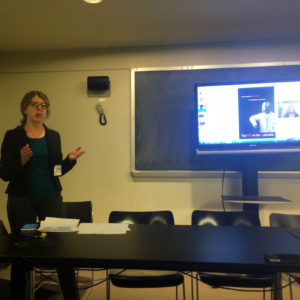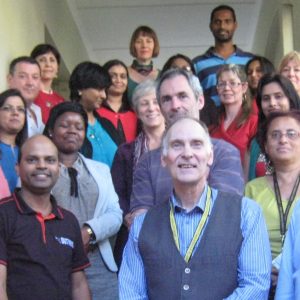Yesterday we showcased exemplary practice in blended e-learning, with presentations from university lecturers at DUT and an inspiring keynote address by Prof Daniella Coetzee from the University of Free State. Take a look at the short video (below) that highlights the achievements of the e-Learning Project over the last five years. The project increased the number of online classrooms at the University – 19% in 2013 to 68% in 2018 – and enrolled lecturers in certificated professional courses to develop their online teaching skills.
COIL Posters Bridging Cultures

The essence of good collaborative online international learning is a seamless continuum between course content and intercultural dialogue. So said Henry Shepherd of the Stephens Initiative in his keynote at the recent COIL Conference in New York. He was referring to an exciting initiative between Tshwane University of Technology (TUT) in South Africa and SUNY Rockland where graphic design students had shared similarities and explored misunderstandings between their cultures while creating posters around themes like xenophobia, rising university fees, cyber-bullying and gun control. Hendali Steynberg and her SUNY Rockland colleague, Eileen MacAvery Kane, encouraged their students to produce “video icebreakers” to give each other a sense of the different environments. Says Hendali: “A project with soul where there is so much to learn from each other!” The project points towards future successful joint online classes using graphics as a meeting point.
Posters by South African students (starting top left): Nsovo Manganyi, Nombuyiselo Gogwane, Mafemo Phillimon and Mashie (TUT students, 2015). See more at http://rcc.macavery.com/south-african-students/

ICEL 2014 – Share your e-learning research findings
Thanks to Anita Hiralaal of the School of Education for sharing this ICEL 2014 conference announcement. The International Conference on e-Learning (ICEL) is an excellent forum for sharing research in the e-learning field. ICEL 2013 was held at the Cape Peninsula University of Technology and next year’s event is being held in Valparaiso, Chile at the Santa María Technical University on 26-27 June 2014. The Abstract submission deadline is 5 December 2013. See http://academic-conferences.org/icel/icel2014/icel14-call-papers.htm for details.
Amongst the keynote speakers in Chile next year are Susan Crichton, and CPUT academic, Eunice Ivala. At the 2012 ICEL in Hong Kong where I presented a paper, I was impressed by Susan Crichton’s research into the re-purposing of learning content material such as instructional videos, podcasts and simulations so as to have maximum benefit in an open-access (OER) environment. Crichton made a forceful case for the inclusion of appropriate and comprehensive metadata to guide the re-user community. She articulates this approach in her paper “A Content Design for Emerging Appropriate Technologies”, where she argues that a key element in a new model for the deployment of appropriate technologies in challenging contexts is the provision of a workflow that allows instructor autonomy. The ability to make changes and customise the materials on the fly has traditionally been locked by the original designer or proprietary package. By breaking down the content into re-usable bits, the model avoids the “cultural imperialism” of exporting the entire course as a ready-made item to an audience for whom it may not be appropriate. This theme was also addressed by Eunice Ivala in her paper “Digital Storytelling and Student Engagement”.



